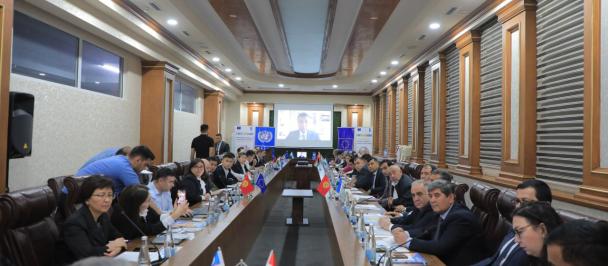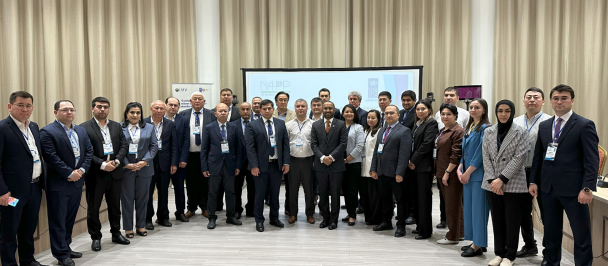Photo: UNDP Uzbekistan
As climate change continues to significantly impact communities and the natural environment, ahead of potentially record-breaking summer temperatures, addressing this situation needs adoption of renewable energy sources including solar, wind, geothermal, biomass and others. Educating future energy professionals on these resources and their role in mitigating climate change must be a priority.
On April 29, students of Tashkent City universities visited renewable energy facilities in their city and the surrounding Tashkent region. On this tour the students learned about the significant research and development projects implemented by the ‘Physics of the Sun’ Institute of Material Sciences. They also visited examples of solar energy infrastructure supporting communities in the Tashkent region, and the Physics and Technology Institute under the Academy of Sciences of the Republic of Uzbekistan which develops advanced photovoltaics (PVs) and solar water heaters.
At the ‘Physics of the Sun’ facility, university students were guided through the site’s unique facilities, and learnt about technologies using the sun’s rays to generate energy, heat water, and melt metal, among other applications. They also witnessed how a small-scale PV installation powers a hydrogen station which separates water into oxygen and hydrogen, the latter gas being one of the cleanest energy sources available. Once the challenge of storing and transporting hydrogen is addressed, with the Tashkent region facility currently seeking solutions in this direction, hydrogen can be utilized on mass as a key source for green energy generation.
Students also visited the 40kW-capacity PV array located at the Urta-Saray town of Tashkent region. At this site the participants learnt about the individual components of PV cells, the technology used to manufacture them, and how the generated energy is delivered to the power grid for use by local households and businesses.
Shukhrat Khakimov, a student at the International Digital University, observed that “this technology has great potential as the rooftop PV arrays can be installed on residential buildings in urban areas. Considering the features of Uzbekistan’s climate, these arrays can play a substantial role in decreasing use of fossil fuels in generating electricity.”
The tour ended at the Physics and Technology Institute, where students learnt about the most recent research into solar energy’s potential in Uzbekistan. They observed the demonstration of a ‘Tesla’ electric vehicle (EV), and found out more details about its technical features, charging and maintenance processes, and its operation requirements.
“Today we learned about alternative energy, renewable energy sources, PVs and wind farms, all being green energy technical solutions which are climate- and environment-friendly,” said Nadirbek Agzamov, a master's student at the Tashkent State Transport University. “Tour helped us better understandthe global climate change challenge, and the urgent action and efforts required to address it.”
This study tour was organized within the framework of the regional project ‘Policy action for climate security in Central Asia - Phase II’ implemented by UNDP jointly with the Center of Hydrometeorological Services (Uzhydromet) of the Republic of Uzbekistan, and funded by the UK Foreign, Commonwealth and Development Office (FCDO). The project plans to conduct additional study tours and interactive climate-related activities for interested students, engaging them in matters related to environmental protection and climate change mitigation.

 Locations
Locations


